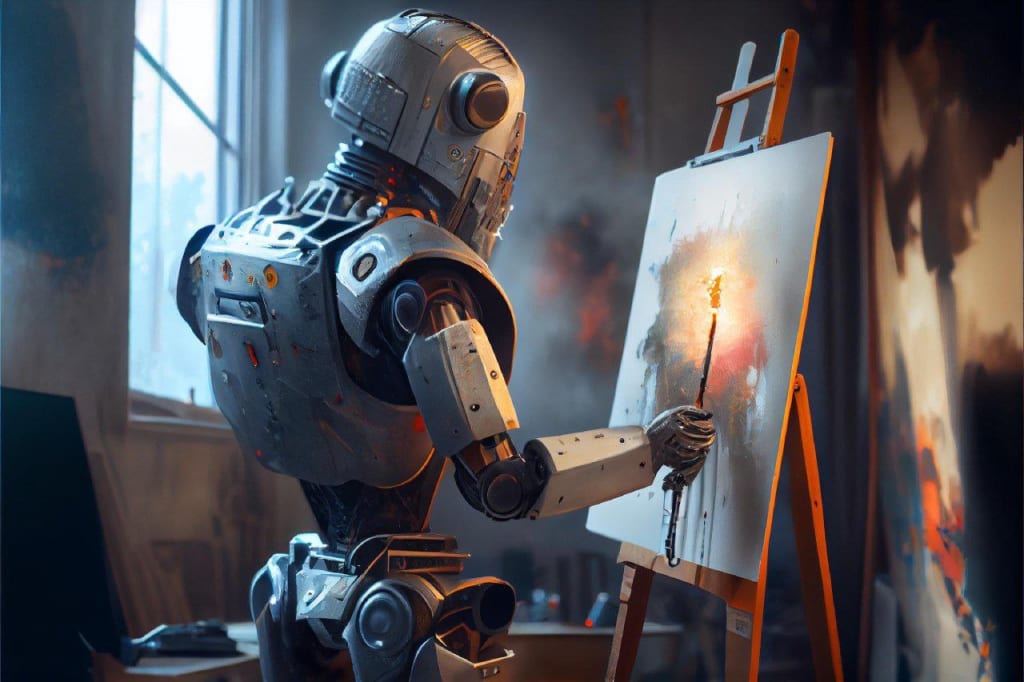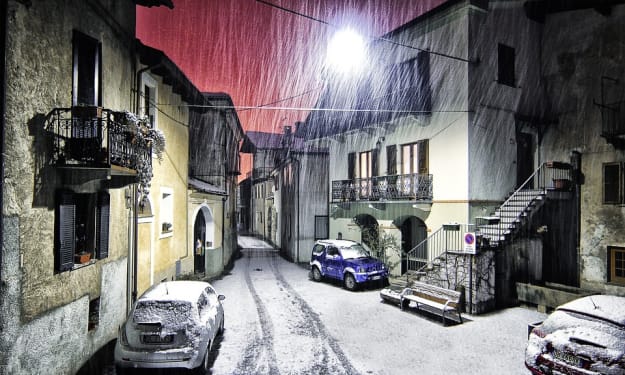
It was terribly cold. Snow was falling, and it was almost dark.
Frost and cold drove people into the houses, cruelly catching them with cold claws. The wind tossed prickly snowflakes into their faces, ruffled their clothes, and mercilessly bit their cheeks and noses.
City 133 has always had winters like that. Dark, starless, bitterly cold, and windy. And they seemed to last 300 days a year. Spring did not warm for long, barely melting the crust of ice on the ground, and went away again.
Residents of the city were used to the harsh weather in these parts. Their houses were insulated, their clothes and leggings lined with fur, the locomotive regularly brought everything they needed twice a week, and the robots were hardy and resistant to low temperatures.
But it was not always like that.
Ajax was at the corner.
His slightly awkward figure seemed to be pressed against the brick wall of the house, he staggered slightly in the strong wind but did not fall. His not-too-long legs were not adapted to such a high level of snow, and the robot was almost waist-deep buried in a snowdrift.
From the side, it seemed that this old robot was no longer functioning. He stood so still that he looked like a trash can. But the center of his chest was still glowing green. It was a dim, barely noticeable light of the battery, which was about to fail completely. And that dim sign of existence burned with stubborn persistence, though it had only an hour of charge left.
An old red dog huddled next to the robot. The animal was looking for warmth from the only one he remembered and who remained with him. But the steel shell of his friend was not warm and was probably colder than the frozen tiles on the pavement.
Two lonely figures in the middle of a long, cruel winter.
Small passers-by did not notice them. They wrapped themselves into their scarves, lifting the collars of their coats, and hurried into the warmth of their homes. The bright yellow windows promised hot wine and the fireplaces, and the old dog sometimes rose his eyes, watering from the wind, and looked with dull melancholy and hope at the distant alien squares...
More recently, they also had shelter. He and Ajax.
The iron arm of the robot moved, and a layer of snow fell from it.
Hard cold fingers touched the dog's head and seemed to caress him uncertainly. The dog pressed against his side again, ignoring the cold.
Ajax didn't want to 'die.' As far as robots were capable of wanting or not wanting. Gigabytes of data were stored in his memory, mostly frames from the past. And he spent the last minutes of the charge looking through them over and over again. That was all he had left. Memory card. Where his former owners walked and talked, the old dog lay on his warm couch, a soft yellow light burned, and a coffee pot with fresh pies cooled on the table ... If Ajax could cry, he would cry. If he could be afraid, he would be afraid. But the robot only scrolled through the same memories like slides, wanting to return to the past incomprehensibly...
The old dog wanted it too. But unlike Ajax, he had to suffer physically.
So they stood, two useless creatures in the darkness of the cold.
***
Lucio turned up the collar of his old coat and left the pharmacy. It was only eight in the evening, but a dark veil had already shrouded the entire City in darkness. Old goggles protected the eyes from the wind, but a heavy snowstorm hid everything at a distance of five steps.
The old man slipped a bag of medicine into his pocket and hurried home. A couple of times he collided with other passers-by and almost fell. He had to move to the side of the sidewalk not to slip again. He practically pressed himself against the wall, walking almost gropingly. Each step against the wind was difficult. He often stopped to catch his breath and felt his knees trembling treacherously.
He inhaled the cold air, and prickly snowflakes immediately settled under his nose, turning into white frost and melting. Lucio walked, holding on to the wall until the line of houses ended. His fingers found the edge of the end of the wall. The old man took a couple more steps and almost fell from surprise: two figures blackened in the darkness to his side. It took him a couple of seconds to realize that these figures were short. And another minute to see a barely noticeable greenish reflection in the frosty fog. Lucio stepped closer.
It was a dog and a robot covered in a layer of snow. Lucio did not doubt that it was the robot in front of him. The old man saw enough of them to roughly recognize the series even in poor lighting and in a blizzard. Judging by the height, it was an old-fashioned robot, and they were the only ones with batteries.
The dog shook his head, throwing off the snow, and looked at the man with cloudy eyes. Well, those two were still alive.
Lucio brushed the snow off the robot. He was right.
A slightly awkward square head, a massive chest panel, and a battery core built into it. Old good AN142.
Lucio knew that some old people like him preferred not to change robots. Whether it was sentimentality or conservativeness, he did not know. Lucio has never had a robot.
"How did you two end up here?" he muttered, stroking the frozen dog. The dog eagerly snuggled up to his arm, seeking help and warmth.
Lucio scratched his chin thoughtfully. The robot stood silently, his last energy was running out.
"Can you hear me?" the old man looked into the round, dull eyes of the visors, "Are you functional?"
The visors flashed a bluish light and blinked a couple of times.
"My functions are limited," came the mechanical voice, "But I can hear you."
"Can you go?"
The robot stretched its arms forward as if testing its capacity.
"I think I can."
The phrasing of the answer surprised Lucio. Robots did not use such turns of speech. "I think, I feel, I want..." Just because these feelings and functions were not available to them.
"Well then, let's go," Lucio nodded to the dog, "And you too. Let's go."
He did not understand why he took them. It just seemed to him that leaving someone on the street in such weather was a crime. Even if it's just a robot.
Lucio rented an attic from The Duff Chloe. She ran a small grocery store near the main square, and out of the kindness of her heart, rented out the attic for mere pennies. Once, Lucio was one of the best mechanics in the City. He could fix absolutely everything, from airships to watches. But with age, his skills have become dull. Vision failed, hands began to shake, and health was not what it used to be.
He sold his shop and moved into a smaller and cheaper space. Now he made a living from rare orders from regular customers. Those who were still alive. Many people preferred to go to mechanics who knew the latest models of robots. Lucio was too old for that.
They walked for a long time, even though Chloe's shop was just around the corner. Lucio tried not to fall, the poor old dog was completely cold, and the robot was almost at zero charges.
The shop was warm and light. Electric and oil lamps kindly illuminated the storefronts.
They climbed up to the second floor, creaking old floorboards.
"There's not much room here," Lucio said to no one. Either an old dog or a robot. "But I think the three of us will be alright."
The attic was littered with all sorts of iron stuff: gears, panels, bolts, panel batteries ... There was a bed against the far wall, a small table with an oil lamp, and a wardrobe. And near a small round window, there was an easel with paints.
Lucio rummaged through the closet and pulled out an old coat.
"It'll do for the first time," he nodded to the dog and laid his coat on the floor by the bed, "Then we'll find you a suitable bed."
The dog immediately hobbled over to the new bed and lay down there, looking at the old man with tired, trusting eyes.
Lucio went to the table where the gas stove stood, warmed up some porridge, crumbled a loaf of bread there, and put it in front of the dog.
"There's nothing else, buddy."
The dog didn't complain. It was warm, there was food - what else was needed?
"And you," the old man looked at the robot, "Come over here." He pointed to a place near the table lit by an oil lamp. The robot obediently rumbled to the table, leaving wet footprints on the floor.
"Let's see what's wrong with you," Lucio muttered as he put on his goggles. He gently wiped the moisture from the robot. The old versions were rather carelessly made, their parts were attached with soldered braces, in some places with bolts. Lucio unscrewed a couple on the robot's chest, revealing an iron plate. The robot was in good condition, there was no rust anywhere, the gears were lubricated. It was evident that the previous owners cared for him.
"Well, it's just the battery," the mechanic said thoughtfully, "Yours is worn out. Needs to be replaced...Wait a minute."
He began to rummage through a pile of iron stuff.
"My name is Ajax," the robot suddenly rasped. Lucio looked at him in surprise.
"So you've been given a name," he looked around Ajax as if seeing for the first time, "Well, I'm Lucio. And you're damn lucky, Ajax."
So they began to live together. Chloe grumbled a little about the dog, but she had a kind soul. Often she brought him food from home, took out an old down jacket for bedding, and even knitted a sweater. The dog looked strange in this but did not try to pull it off. Apparently, it was really warm.
Lucio managed to replace Ajax's battery.
There was not enough space for three, but Lucio was glad for the unexpected company. He talked to them for a long time, although neither the dog nor the robot could answer him in the same way. Ajax was too old a model, and his vocabulary was limited to twenty phrases.
Most of the time, the robot stood motionless in the corner, glowing with a green charge. Lucio knew that perhaps the previous owners gave him certain tasks. Like, going to the store, sweeping the floor, watering the flower beds ... But Chloe bought almost everything necessary, Lucio could sweep the floors himself, and he did not have flower beds. But he understood that the robot should not be idle. Sometimes Ajax looked at the spare parts on the table with something similar to interest, closely following the work of a mechanic and soon could even help him. But his real interest was the easel. Surprisingly, Ajax had never seen that before. Lucio liked to draw, although he was not very good at it. As children, he lived in a very picturesque place, and Lucio's mother often painted landscapes. The love of oil and watercolor was passed on to her son, although he did not succeed at it.
And so, to pass the long winter evenings, Lucio decided to teach Ajax how to use the brush.
It turned out not to be easy. Iron fingers were not adapted to hold small things, and the brush constantly fell.
"Okay, let's take a break," said Lucio, sighing. He pulled out a thick, wide book with a tattered spine and a worn cover and began to leaf through the yellowed pages, showing Ajax the paintings of the great artists of bygone eras.
The robot looked and remembered. Strange, complicated names stuck in his memory, along with smooth lines and soft colors that old paper could convey. Michelangelo, Da Vinci, Botticelli...
Merging beautiful forms created in antiquity with new ideas of Christian humanism and pantheism.
Amazing frescoes by Giotto. The volumetric figures. Faces of noble people. Old and young. Sad. Mournful. Surprised. Different.
Ajax knew about such a book as the Bible, the former owners were very pious. But he had never been to church, and Giotto seemed to be showing him colorful, lively passages of Scripture.
The beautiful brush of Masaccio, who created a true art miracle. Ajax had never before looked at people from either the objective or the subjective side. He was incapable of looking and comparing. He could only analyze the solution of his actions based on the tasks set. That was his program. But looking at the paintings of Masaccio and Da Vinci, he first saw, did not realize, but saw the difference between robots and people.
But most of all he looked at still lifes. The rich, vibrant colors of Ladell, Lance, and Hayden looked like the real thing, sometimes even better than the real thing. And Ajax could even imagine, describe the taste of peaches, the smell of peonies, the scent of roses... Never before had he wanted to find designations for these words and images. Now he almost understood them.
He shifted his gaze to his fingers, clumsily turning over the pages, and involuntarily looked at the smooth curves of human bodies. It did not cause him any regret or sadness... So far, there was only awareness.
Over time, things got better with the brush. Of course, portraits were not easy for him, but Ajax did not seek to learn how to draw them. He diligently drew circles, curves, semicircles with a brush ... At first, they were just spots on the canvas, but soon, under the guidance of Lucio, they became more like fruits or jugs. Curved lines turned into leaves and cuttings, semicircles into petals. Lucio bought once a week a modest bouquet and put it in front of the robot. Or a couple of apples with a jug and set them from different angles. And Ajax painted. He painted for hours, days until the battery started to run low.
Lucio watched him silently. He understood this strange thirst, inexplicable from the point of view of science. Ajax did not develop, he had too little data for that. But he already had a part that could become something more than just a program.
It couldn't be said that these were masterpieces, but Lucio liked the paintings of Ajax. The old man swayed measuredly in a creaking rocking chair, watching the robot neatly brought out the lines. And Lucio could watch him for hours.
There were three weeks left until spring.
Three weeks when it becomes noticeable that the nights have become a little shorter, the sun lingers longer on the horizon, and the wind is no longer so vicious.
Lucio died a week before the first snowdrops.
He died quietly, in his sleep. The old emaciated heart could not stand it at last. The dog howled softly in the corner, sadly looking at the empty bed ... Ajax also just stood there for a couple of hours, not understanding what his prospects were from that moment. Kind-hearted Chloe left them to live in the attic, continuing to feed the dog.
A day later, when Ajax's battery was no longer so bright, he again picked up a brush.
Outside the window began the first drop, the thaw was approaching. Droplets of melting frost froze on the glass. The robot looked at the dirigible floating across the sky for a long time, reading something in its outdated database. Then he brushed across the canvas.
On the table were apples and pears brought by Lucio. But Ajax did not look at them.
Hour after hour, diligently and methodically, without looking up from the canvas, he painted. He painted until it got dark, and the twilight touched the walls of the attic, embracing two again orphaned creatures. He drew when his battery turned light green, then dim, like a burnt-out lantern.
Behind him, on a feather bedding, an old dog screwed up its teary eyes.
The morning was bright and sunny. The first rays of the sun boldly illuminated the quiet room.
The dog opened his eyes.
Ajax stood at the easel, his right hand frozen in the air holding a brush. As if he wanted to add a couple more touches.
The dog got up tiredly and slowly approached the robot, sniffing it. Then he whined softly, licking the cold metal and poking his nose at his old friend.
The battery on the robot's chest went out.
The sun was rising quickly, flooding the attic with spring warmth. Warm light touched the easel, illuminating it with a yellow glow. Flowers blossomed on it. Yellow, red, purple. Their petals, like palms, caught the sunny rays, bringing a riot of colors and life into an empty room. The last thing that could remain of those who once lived there. And even the great Giotto would have admired the skill and uncomplicated feelings in this picture...
Somewhere in the distance, church bells rang out.






Comments
There are no comments for this story
Be the first to respond and start the conversation.